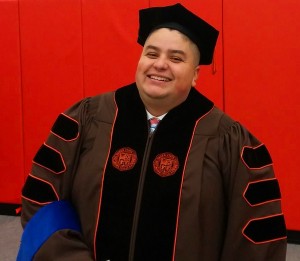by Dr. Joe Faykosh, PhD. Bowling Green State University and Professor of History at Central Arizona College
We asked Dr. Joe Faykosh, alum of our History graduate program, to write a reflection on what the election of Donald Trump and his presidency so far means for political history.
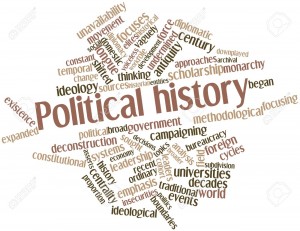
In August 2016, Fredrik Logevall and Kenneth Osgood wrote an op-ed in the New York Times titled “Why Did We Stop Teaching Political History?” Logevall and Osgood oriented the decline of the field in the 1960s and 1970s, as universities started to reject old-school approaches to recording history, interested in diversifying our field. I received that memo very late in the process: I was on the brink of defending my doctoral dissertation at BGSU and wading into the scary waters of the academic job market.
I did not get into political history because I loved telling the stories of old white men, or because I wanted to defend the status quo. I got into the field because, very early on in my life, I fell in love with partisan politics, and stories of the individuals who were launched into political power. I always tell students that I made a conscious decision very early on to separate the political theater from governing: I do not obsess over the minutiae of presidential administrations (at least, not in my research these days), but focus instead on the spectacle of convincing millions of Americans that often unqualified, ignorant, and psychologically damaged candidates have the best interests of the vast swath of the constituency at heart. We hear the same promises election after election and the fulfilment of those promises rarely staunch the attraction of the sideshow carnival.
The 2016 election was no different. In my dissertation, I made comparisons between the parties of the 1920s and today, and how both parties had serious restructuring on their horizons. More voters went to the polls to vote against a candidate than for one, and untold numbers were completely turned off by the spectacle and refused to participate. In the wake of Donald Trump’s shocking election, we have seen a resurgence of attention focused on the performance of the office, but I am, as always, fascinated by the promises made, and the crowds who still show up to be swayed.

George McGovern
My next project will use a part of my dissertation, A Party in Peril, to examine the efforts of Franklin Roosevelt and George McGovern to rebuild the Democratic Party after disastrous elections in 1924 and 1968. In both cases, the party leaders were interested in opening the party’s decision-making and allowing the party’s faithful greater access to choosing the nominee at the precise moment of a realignment election. If done properly, the historical comparison of these two leaders can illuminate what both parties face in terms of party restructuring.
I do have one last observation that I want to share: Judging from social media, you would believe, contrary to Logevall and Osgood, that political history was among the most accessible fields. Not everyone can explain global climate change, quantum physics, or the intricacies of the immigration laws, but somehow, nearly everyone feels that they can compare the current (and previous) administration and political figures to the two hundred years of American political history that precede us. They view politics as a giant version of the “clap-back”: X happens, so we compare it to Y, and make a joke about Z. We live in a society saturated by political content in cable news and accessible websites that cater to the most depraved excesses of the political extremes. Rather than helping us think better historically, we have retreated to our corners, brandishing history-as-silencers, useful only to obviate your opponent’s argument.
More than ever, we need to focus on the tools that historical inquiry provide us, and adhere to the process. History, political or otherwise, does not exist solely to serve as a referendum on the current situation, and should not be wielded as a weapon to silence opposition. Instead, history can provide insight into how we have dealt with political turbulence before. History can provide us with the lessons of marginalized and underrepresented groups who persevered in worse times. History can also be used to demonstrate the importance of having more than one viewpoint, more than one cache of evidence, and more than one conclusion to draw from the myriad names, dates, and figures who precede us. Historians are at our best when we are sharing the fruits of our labor, shining a spotlight on a forgotten or overlooked section of our past, providing some new way of looking at who we are and how we arrived at this moment. Every now and then, it offers us a way of dealing with the new reality, and, just maybe, a way out of the messes where we find ourselves.
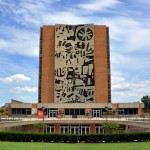

 As my submission deadline approached, my thesis advisor, Dr. Rebecca Mancuso, reached out to me about a potential internship with the
As my submission deadline approached, my thesis advisor, Dr. Rebecca Mancuso, reached out to me about a potential internship with the 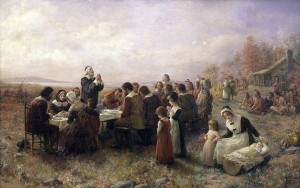


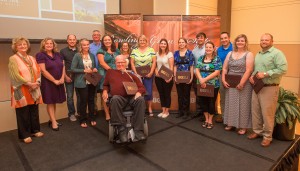
 This Sunday at 11:00 AM on 13 ABC, “Conklin & Company” will address the removal of confederate monuments. The show invited Dr. Nicole Jackson to answer questions such as are statues bad for future generations? What do we owe our kids and grandchildren when it comes to history? Watch the show this Sunday on 13ABC and find out! The tape will be posted online during next week
This Sunday at 11:00 AM on 13 ABC, “Conklin & Company” will address the removal of confederate monuments. The show invited Dr. Nicole Jackson to answer questions such as are statues bad for future generations? What do we owe our kids and grandchildren when it comes to history? Watch the show this Sunday on 13ABC and find out! The tape will be posted online during next week 
